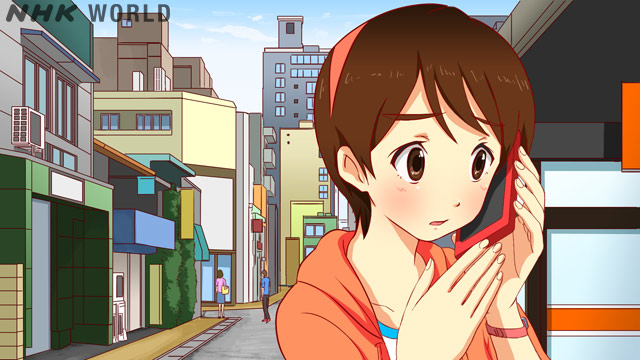Lesson 18
I'm lost.

Anna visited a bookstore with Sakura and Rodrigo. After they left the store, Anna has lost sight of the two.
Key phrase:
MICHI NI MAYOTTE SHIMAIMASHITA
Scripts
| アンナ | もしもし、さくらさん。助けてください。 道に迷ってしまいました。 |
Hello, Sakura. Please help me. I'm lost.
|
|---|---|---|
| Anna | MOSHIMOSHI, SAKURA-SAN. TASUKETE KUDASAI. MICHI NI MAYOTTE SHIMAIMASHITA. Hello, Sakura. Please help me. I'm lost.
|
|
| さくら | 今、どこ? | Where are you now?
|
| Sakura | IMA, DOKO?
Where are you now?
|
|
| アンナ | 目の前に郵便局があります。 | There is a post office right in
front of me.
|
| Anna | ME NO MAE NI YÛBINKYOKU GA ARIMASU.
There is a post office right in
front of me.
|
|
| さくら | 分かった。そこにいて。 | I see. Stay there.
|
| Sakura | WAKATTA. SOKO NI ITE.
I see. Stay there.
|
Grammar tips
TE-form verb + SHIMAIMASHITA
 You say SHIMAIMASHITA after the TE-form verbs to express that you have done something carelessly or absent-mindedly.
You say SHIMAIMASHITA after the TE-form verbs to express that you have done something carelessly or absent-mindedly.
e.g.)
MACHIGAEMASU (to make a mistake) >>
MACHIGAETE SHIMAIMASHITA
(I’ve made a mistake)
To learn more, please read "Teach Us, Teacher".
Teach Us, Teacher
TE-form Verb + SHIMAIMASHITA
If you say SHIMAIMASHITA after the TE-form of verbs, you are saying that you have ended or completed an action. That is to say, you can no longer redo the action, or bring it back to the former state. So, you often use SHIMAIMASHITA, when you have failed in doing something or showing regret for what you have done.
Sound Words
Panicked / Moving around
Japanese is a language with lots of onomatopoeia. A wide range of onomatopoeia in the Japanese language, from noises made by animals to expressions of feelings, is explained by audio.
Anna's Tweets
I was told if I ever get lost, I can go to a police box. People say police officers will show me a map that tells me which way to go.

